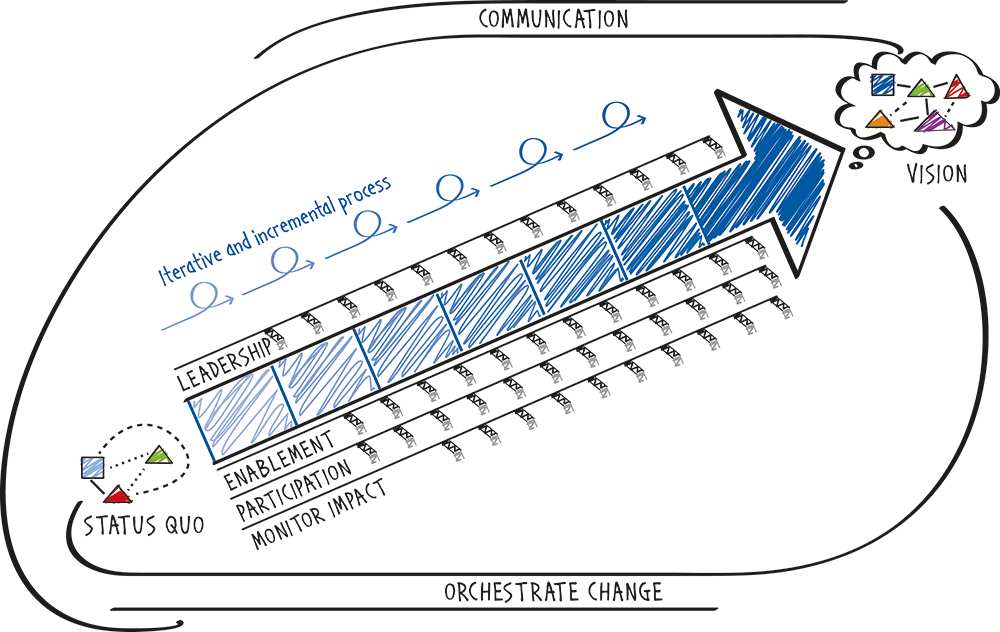Change
Change management consulting for your change
Change management means preparing the ground so that structures, processes and behaviors can fundamentally change in the first place. Our change management experts plan and orchestrate change in order to successfully and sustainably implement the desired transformation, minimize risks and reduce resistance to change. Our goal is to foster a corporate culture that is flexible, adaptive and open to change in order to maximize your business success.
Contact Stephanie Lohß at
"We support you in making your organization's change process agile and sustainable and in leading your change to success."
Change Management: Definition
Change management is a systematic approach to introducing and implementing change within an organization in an effective and smooth manner. This systematic process helps to manage the impact of new business processes, changes in organizational structure or cultural shifts within an organization. It involves structured processes and activities that are carried out at an organizational, team or individual level to facilitate the transition from a current state to a desired future state.
In a business context, change management can be used for a variety of changes, including organizational restructuring, implementation of new technologies, process improvements, changes in corporate culture, strategy shifts, and more.
The main objective of change management is to introduce change in a way that minimizes negative impacts on employees and the business, reduces resistance to change and increases employee acceptance and commitment. Through effective involvement, communication, training and support, employees can be motivated to support the change and integrate it effectively and profitably into their day-to-day work.
Factors for a successful transformation
At its core, every change is made by people and for people - and therefore only works with and through people. It is therefore important to align a transformation through leadership, to inform and involve employees and - where necessary - to train them. Changing an entire organization initially seems like an immense challenge. And you know what? It is. But if you transform your company in small, manageable steps, you have the best basis for achieving your big goal. We have been supporting organizations with change projects for more than 20 years. In this practice, the following factors have crystallized for the success of a sustainable transformation:

Vision: The definition of a legitimized target or vision is important for a successful change. The target reinforces the necessity and urgency of the change and provides clarity about the economic benefits of the change project. It provides all those involved with a desirable state to be achieved by the change.
- Status quo: A shared view of the current state of the organization is important as a starting point for change. In order to achieve a legitimized status quo, a status quo analysis is useful. This involves creating a common picture of the starting point together with the organization. What is the current way of working? What is the current structure? What are the current challenges? A status quo analysis answers these and other questions and assesses the results in relation to the business objectives. Different perspectives from different roles (e.g. teams, management) are brought together to form a common picture. This allows the organization to know where it stands.
- Leadership: Managers lead the change and are responsible for the success of the change project. Managers act as trailblazers who not only communicate the target image clearly and regularly, but also create the necessary framework conditions so that the organization can change.
Successful leadership is characterized by the fact that it not only develops strategies, but is also actively part of the change and acts as a role model. This includes removing obstacles and supporting the organization during implementation. - Iterative and incremental approach: A change project is complex, as the effects of change steps cannot be predicted in their entirety. For this reason, an empirical approach is recommended. Proceeding in incremental and small steps supports the handling of complexity. During this process, it is important to evaluate the progress of the steps and make adjustments if necessary. This ensures that the solution developed in the change project is optimally geared towards achieving the business objectives.
- Empowerment: Empowerment is the basis for being able to implement the change. In a change, people are empowered to be able to demonstrate the performance and behavior required by the change. You learn to understand and exercise your role and responsibility in the target picture. This can take place in various formats: Training, workshops or individual support such as coaching or mentoring. In this way, empowerment becomes a building block for the acceptance of change and a reduced occurrence of resistance.
- Participation: Participation is an element for the sustainable anchoring of changes and acceptance. This means that those affected are involved in the process at an early stage so that their perspectives and expertise can be incorporated into the solutions. This ensures that the solutions are feasible and effective. A high level of participation promotes motivation to actively implement the change.
- Track impact: As the change is implemented, it is important to regularly evaluate the effectiveness and benefits quantitatively and qualitatively - to identify whether the change is moving towards the target picture or whether corrections are needed. This can be done, for example, by collecting feedback, conducting evaluations or analyzing data.
- Communication: Regular communication creates transparency, trust and acceptance among those involved. Regularity is important in order to anchor the change in the organization's consciousness. Fundamental communication is carried out by the management, e.g. to make decisions made comprehensible and understandable. Communication must not be one-sided, it must be designed as a dialog. This enables the organization to process and implement what has been communicated.
- Orchestrating change: Orchestrating change means managing the entire change project holistically. Orchestration includes the planning, implementation and evaluation of measures that are necessary to achieve the economic benefits of the target image. At the same time, it ensures that the success factors are implemented during the change process. Successful orchestration is characterized by a structured and adaptive approach in order to be able to react to unforeseen challenges. This enables the complex change to be designed as an incremental and iterative process aimed at progress and sustainable success. A change team is usually established for successful orchestration.
Below you will find a self-assessment that you can use to evaluate your own change project based on the success factors described here.
And how long does it take?
This depends on your organization, your situation and your transformation project - and on the extent of the change. The big challenge is to find the right speed and implement the changes across the entire breadth of the organization. If it takes too long, the transformation will not be noticed and will fizzle out. If it happens too quickly, people are overwhelmed, productivity suffers and there is a high level of resistance, which in the worst case can lead to the transformation project being abandoned. We support you in finding the right implementation speed for your organization.
wibas supports your organizational development with change management principles
We support you in approaching change in such a way that it is aligned with your company's business objectives. In other words, a change with us is individually tailored to the needs of your organization. We help you to understand the operating principles of change in order to redesign your company's organizational development and support it with appropriate techniques or interventions. We work as part of your transformation team and provide you with external perspective and feedback in addition to the procedures. With impact monitoring, we make transparent how well the change is working in your company and measure the degree of target achievement - at any time during your change process. In this way, we can always react together in good time and make any necessary corrections. As experts in organizational development, we have many years of change experience and achieve success in small organizations as well as in very large ones with thousands of employees;
Our self-assessment for your change
Evaluate your own change project and receive recommendations
With this self-assessment, you can evaluate your own change project by answering questions based on the success factors for change described above. Based on your assessment, the self-assessment provides you with recommendations on which measures you should take to strengthen your project.
Change Management Consulting
As experts in organizational development, we have many years of change management experience and specialize in supporting companies of all sizes in their change process. Whether it is a complete restructuring, an adjustment of your business processes or a change in corporate culture, we are at your side with our change management consulting;
In doing so, our expertise goes beyond pure change management consulting. We work closely with you to understand the specific needs and challenges of your organization. Within the change process, we develop individual change management strategies specifically tailored to your organization and support you in their implementation. We train your employees to understand and accept change, and provide tools and resources to help you effectively manage the change process.
The aim of our change management consulting is to guide you through change and promote a culture of adaptability in your company. In doing so, we take care to maximize the acceptance and effectiveness of the change within the organization while minimizing potential resistance.
















Examples of successful accompanied organizational developments
Change management and the support and orchestration of change is a basic competence of wibas. We have been supporting companies with transformations for over 25 years. The topics may change, but our attitude remains the same: change through our own efforts. Examples of changes that we have accompanied include
-
Transformation into an agile organization (business agility)
-
Changes in the management culture and in the interaction between managers and employees
-
Organizational restructuring
-
Introduction of new IT systems and associated adjustments to work processes
-
Process improvement
-
Introduction of new processes

Agile transformation at dwpbank
Support for a major agile project and deployment of interim agile coaches to speed up the delivery of solutions and services at dwpbank.

Organizational development in SMEs
Design of dynamically robust working methods and organizational structures to promote innovation & employee participation.

Organizational development in the chemical industry
Establishment of an agile way of working as well as stage planning and introduction of a portfolio level to avoid continuous overload.
Agile Transformation
What is an Agile Transformation? Prerequisites ✓ Procedure ✓ Success factors ✓ Transformation coaches ✓ Roadmap ► Learn more now!
Certified Agile Change Manager
Are you looking for a way to skillfully combine agile approaches and change management? Learn how to make change happen in this hands-on Certified Agile Change Manager training.
New perspective on resistance in change
A common problem in change management is the resistance of employees to change. But there is a model of thinking that can help [...].
Your contact person for change management:
Stephanie Lohß
wibas GmbH
Stephanie Lohß
Otto-Hesse-Str. 19B
64293 Darmstadt
+49 6151 503349-0
